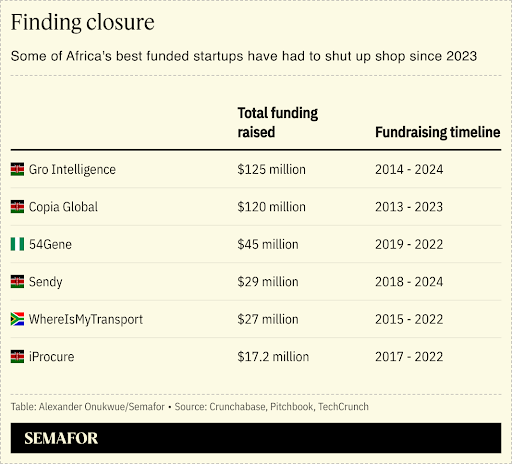The News
Gro Intelligence, a startup founded in Kenya to provide detailed artificial intelligence-powered insights on climate risk and food production for multinationals and governments, is shutting down after failing to secure financing to continue operations.
The startup’s closure, reported by AgFunderNews last week, comes after turbulent months during which its founder and chief executive Sara Menker (pictured above) was removed from her position as part of efforts to stem its decline. The first of multiple rounds of layoffs began in January as Gro struggled to pay staff. Menker, an Ethiopia-born former Morgan Stanley commodities trader, was replaced by the board in February and the startup raised $10 million in March, according to the Wall Street Journal.
The shutdown ends a ten-year run during which Gro raised over $125 million. Its most recent major funding event was an $85 million round co-led by Intel Capital, the investment arm of the American semiconductor chipmaker, in 2021.
At the time, Menker said the company saw “tremendous need” for the “market knowledge” its platform generated, fueling plans to invest in improved machine-learning capabilities and expand aggressively. In addition to its Nairobi base, Gro had a second head office in New York and an office in Singapore.
In this article:
Alexander’s view
Gro’s demise has disappointed African tech investors who tipped the startup to become an exemplar of the continent’s capacity to birth unique global solutions.
With the majority share of investment capital going to fintech to solve local payments problems, Gro made the case for seeking out other types of African innovation that affect a greater proportion of the world’s population. It was praised on innovative company rankings and Menker was feted as a thought leader on food security and climate risk.
But Gro’s crash, preceded by a valuation plunge from $850 million two years ago to under $25 million, is sparking a sober and clear-eyed review of the startup’s history.
On one hand, Gro’s failure comes amidst a funding pullback by venture capital investors, with particularly dire consequences for Africa’s tech ecosystem that has largely depended on foreign money for growth capital. African startup closures in the past year have included logistics startup Sendy in Kenya, WhereIsMyTransport in South Africa, and 54Gene in Nigeria. Copia, another Kenyan startup that raised over $120 million, entered administration last month after failing to meet funding targets.

But as with these examples, Gro is also being reviewed as another case of a struggle to match supply with a large enough market, only being able to win “bits and pieces of business here and there,” according to AgFunderNews, quoting an industry source. Selling multiple solutions to disparate categories of clients seemed like a good way to hedge risk and diversify income, “but without a single killer core use case, achieving and maintaining product-market fit can be challenging,” wrote Emeka Ajene, a Nigeria-based tech analyst.
Notable
- Months before her ouster, Menker told Gro’s board that the startup had lined up deals, including one with Saudi Arabia, that could set Gro on a path to being valued at up to $2 billion, the Wall Street Journal reported in March.


